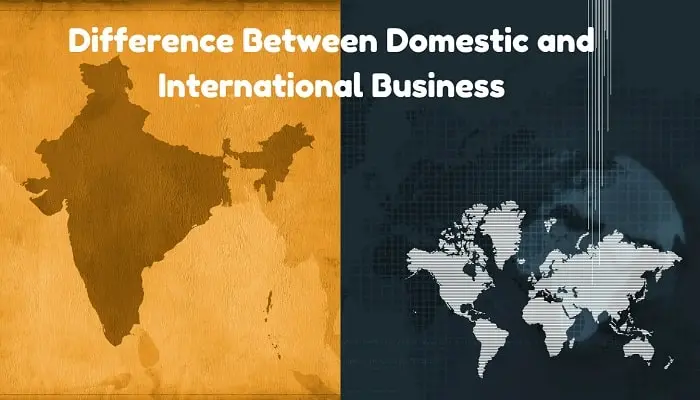Businesses can be categorized in many ways. You may categorize a business based on registration and ownership, or you may categorize the business depending on how it is managed. One another way businesses are commonly categorized is by geographical boundaries. When we talk about geographical boundaries, the businesses are classified as international business and domestic business. Due to globalization and expanding technology, you will find many domestic businesses slowly transiting as international businesses. Both of them are interesting concepts, and let us now learn more about international businesses and domestic businesses.
What is Domestic Business?
Domestic businesses are entities where economic activities are restricted to the country’s geographical boundaries. Here, the buyer and the seller are from the same country, and the currency is also from the same country. Domestic business is often known as home trade or internal business. You will notice that domestic businesses are easier to manage since the stakeholders are very familiar with the country, customers and regulations. It is also cheaper to operate a domestic business when compared with an international business. Apart from this, the brand may have an advantage in the domestic business as there is already established goodwill.
Advantages of Domestic Business
- Advantage of the home country.
- Better market research.
- Communication is not a barrier.
- Easy to understand laws & regulations.
- Easy to understand the market.
- Lower capital requirements.
- Lower market risk.
Disadvantages of Domestic Business
- Access to limited material.
- Higher competition from existing players.
- Restricted customer base.
What is International Business?
An international business is an entity where the trade of products, services, technology and capital is across multiple countries. The geographical borders are not a restriction for international business. The scope of international business may not just be the sales of a product, but it can also be related to soft services or manufacturing of the products. The international business became more prevalent after globalization. The greatest advantage of international business is that the business can gain more customers, especially when the domestic market has reached saturation point. At the same time, the entity gets better exposure to technology, facilities and cheaper labour in international business. International businesses are always restricted by language and cultural barriers, but you can always overcome the barrier by hiring consultants in the country of business. Some businesses also operate in the same region to deal with this language and cultural barrier. For example, a brand operating in India, Afghanistan, Pakistan, Sri Lanka, Nepal and Bangladesh will find it easier to manage business owing to cultural similarities.
Advantages of International Business
- Better Technology
- Can leverage first mover advantage.
- Cheaper Labour
- Earning Forex
- Larger Customer Base
- Reduced Risk
- Resource Optimization
Disadvantages of International Business
- Competition from New Markets
- Geopolitical Dynamics
- Higher Capital Requirement
- New Laws & Regulations
Difference Between International & Domestic Business in Tabular Form
Below is a table that summarizes all the differences between international business and domestic business. Check it out now.
| Basis | Domestic Business | International Business |
| Definition | In the domestic business, the economic transactions and business activities are within the country’s geographic boundaries. | In international business, the economic transactions and business activities are in two or more countries. |
| Trade Partner | The trade partners are the residents of the same country as the domestic business. | The trade partners in international business are from different countries. |
| Trade Currency | The domestic business deals in the home currency. | There are different trade currencies in international business, and hence there is always a risk due to currency volatility. |
| Procurement | The procurement of products happens in the same country for domestic business. | The procurements of goods may be happening from one or more places. |
| Geographical Location | The boundaries of domestic business are within the geographical boundaries of the country. | The geographical boundaries are beyond just one country. |
| Market Research | Market research is relatively easy since the business understands the customer and its requirements. Moreover, procurement is also easy. | Market research can be complex because of the lack of knowledge about the culture, needs and other factors. This also means that market research is expensive. |
| Capital Requirement | The capital requirements are usually less when we talk about domestic business. | The capital requirements are usually more when we talk about international business. |
| R&D | The research and development are not complex. In addition, the research is also cheaper in the domestic business. | The research and development may be complex, but you can leverage technology in some countries which means a superior product or a better manufacturing process. |
| Restrictions | The ease of starting a business depends on the country, but mostly, the stakeholders understand the local restrictions. | The restrictions in international business are usually more than the domestic business. The ease of doing business is subjective. |
| Quality Standard | The quality standards need to be as per the domestic standards. | The quality of the product needs to be as per international quality standards. |
| Business Risk | The geographical or microeconomic risk is higher, whereas the exposure to macroeconomic risk is lower. | The microeconomic risk diversifies, and you can also deal with macroeconomic risks if the business operates in multiple regions. |
| Taxation | Taxation is as per the home country of the business. | The tax is subject to the country of operation. In some cases, the business can take advantage. |
Final Verdict
These were the differences between domestic business and international business. If you look at today’s economy, you will realize that the business should be involved in international business to reduce the risk and to have great brand value. With the concept of globalization and technology, it has become very easy for businesses to go global. Moreover, many businesses are able to save costs by going global. For example, you will come across brands with manufacturing units in countries where labour costs are cheaper. Similarly, you will also notice that many brands prefer doing business in countries with lower tax rates. The domestic business is a great starting point for someone entering the business world, but the end goal should be going global.















